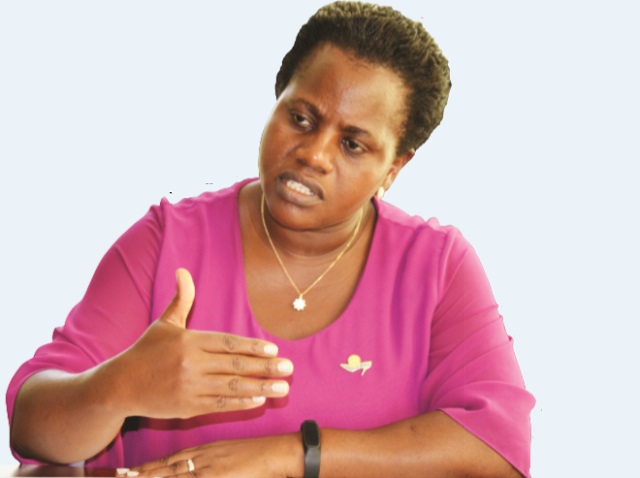
Juliet Kyokunda is the Executive Director of the Uganda Biodiversity Fund. She talked to The Independent’s RONALD MUSOKE on why, among other issues, Ugandan manufacturers should join the conservation cause.
What prompted the creation of the Uganda Biodiversity Fund?
The Uganda Biodiversity Fund was established in 2016 following a meeting held in May the same year. Uganda is one country that has a lot of biodiversity and many stakeholders agreed that there is need for special focus on biodiversity conservation. We have a number of forces that are coming up and threatening this biodiversity. There is agriculture; influx of refugees, mining and oil and gas while poaching also remains a big challenge. At the moment, we are losing a lot of forest and swamps because there is a conflict between national development and conservation. The nation has to develop; we want industries; we want to produce goods and services so that we reduce dependence on other countries but, all this is happening at a cost. We are lucky to have all this diversity in animals and plants but what will happen in future? So, we are saying that we may not be able to conserve everything in the place where it used to be but, we have to, at least, work on a zero-net loss. If you cut down trees here, where else have you planted more so that we don’t lose out completely. So, among the things we are mandated to do, is to look at all the biodiversity in this country, including human beings because we can’t only focus on plants and animals while people are dying of hunger and poverty. So, the Uganda Biodiversity Fund, in addition to soliciting for funds, keeping them and ensuring that they are distributed through grants to different partners for biodiversity conservation, we also look at how the people are surviving in those communities.
How exactly does this model work?
Our job is to look for money for conservation and we do so in two ways. First, through sinking funds; where we get money for a specific cause; sub-grant it to do immediate implementation of projects for which we have solicited the money. But we are also planning on doing offsets. We know that every industry or factory in this country does some kind of harm to the environment. So we are planning to bring together the industrialists and businesses in this country to impress upon them the fact that if their businesses are going to remain viable, they need to embrace environmental conservation. We want to tell them that the people they employ and sell their goods to rely on the environment for survival. So,if you deal with chemicals and these end up in the water that people drink, tomorrow the businesses will directly be hurt even if your current concern is money. We, therefore, want to bring the manufacturers in the country on board so they contribute to a conservation endowment fund which looks at today and the future. We are targeting manufacturers and other donors to contribute towards that basket. What this means is that there will be continuity in our efforts to conserve the environment. Conservationists in Uganda at the moment rely on donors who genuinely give but the challenge is that conservationists are not assured of more tomorrow. So sometimes they cannot implement projects beyond completion because of limited funds. The endowment funds are, therefore, essential for the conservation of biodiversity in this country.
Explain more how endowment funds would help do conservation work?
Endowment funds would help us work in every part of this country depending on the urgency and need. If we, for example, know that Mount Elgon is a time bomb, we should be able to look at Elgon in totality; not piecemeal. For now, we have different organizations doing commendable work within the Elgon region but each of these is more or less doing its work. But if, as a country we have an endowment fund, we should be able to sit down as stakeholders and say let’s tackle Elgon in the next three years. These are the activities in the first year, these will be done in the second year and we need to do three years. By the end of the third year, we should not have any problems with Elgon because we have tackled the challenge consistently and in totality. Those are some of the advantages of working with endowment funds.You can work anywhere but you are also able to phase your projects and make sure you follow them through up to completion. I will give you an example of Mozambique. They have about US$70 million in endowment funds and so they are able to look at their key biodiversity areas and see where there is urgency. For now, they are restocking their game reserve within Maputo. They are consistently working on it; fencing it, restoring and making it better. They want to bring it up to standard and ultimately turn it into a national park. They are able to do all that because they know they have endowment funds that generate income every other year.
How do you intend to interest Ugandan businesses and industrialists to support biodiversity conservation?
They need to know that they have to be responsible in their way of doing business. Some of them are doing lots of things behind the door, hoping and praying that no one finds them. That is an irresponsible way of doing business. But, we also think that you cannot judge people until you have talked to them; maybe they are ignorant about their businesses’ impact on the environment. So we shall reach out to them, speak to them and tell them about what they can do and then see if they are able to change.
 The Independent Uganda: You get the Truth we Pay the Price
The Independent Uganda: You get the Truth we Pay the Price





